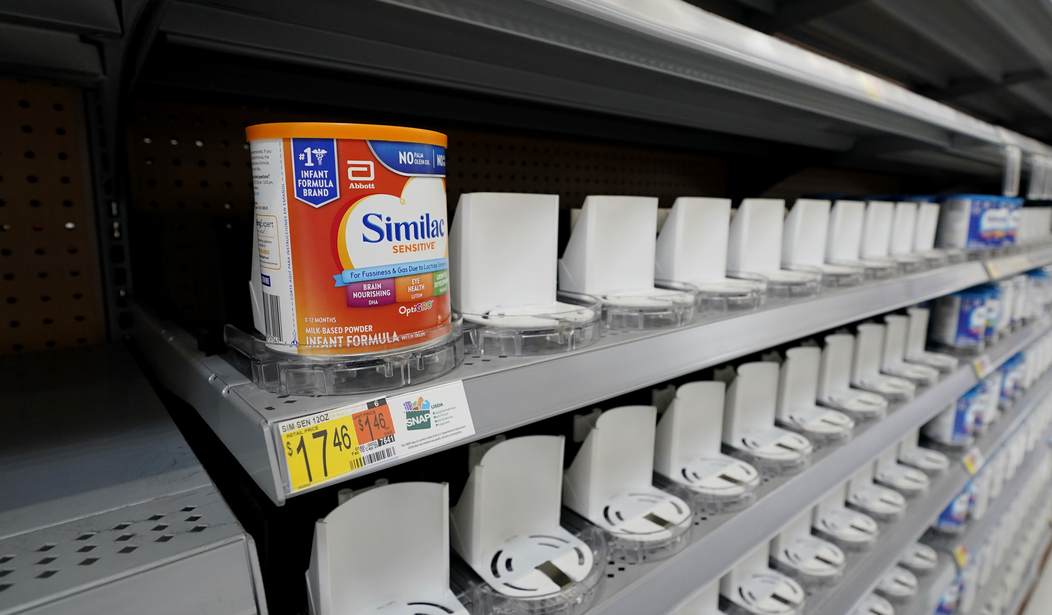It's been a little over a year since Abbott issued a voluntary recall on several of its infant formulas. The decision was made after consumer complaints about bacterial infection in babies who consumed products manufactured at its Sturgis, Michigan, plant. The recall wasn't the only pinch on the domestic availability of formula, however, as supply chains were already strained from the pandemic. The result was a massive shortage that had parents scrambling to find formula for their babies. But instead of treating the shortage like the crisis it was, the Biden administration slow-walked its response, with the president himself admitting he didn't get informed about the problem until months after industry leaders were warning about the looming crisis.
So, what has changed in the last year to ensure this never happens to our nation's most vulnerable again? According to a former Food and Drug Administration official, not much.
"The public health surveillance system for this pathogen [Cronobacter sakazakii] remains insufficient, the necessary safeguards have not been advanced or strengthened at an adequate pace to prevent a re-occurrence or future illnesses, and the infant formula supply chain continues to lack resiliency," Frank Yiannas, the former deputy FDA commissioner for food policy and response, said in prepared testimony before the Subcommittee on Health Care and Financial Services. "In other words, the nation remains one outbreak, tornado, flood, or cyber-attack away from finding itself in a similar place to that of February 17, 2022."
Former FDA Deputy Commissioner @frankyiannas on 2022 baby formula shortage: "The state of the infant formula industry today is not much different...The nation remains one outbreak, one tornado, flood or cyberattack away from finding itself in a similar place." pic.twitter.com/MugLjTm3u6
— CSPAN (@cspan) March 28, 2023
His prepared remarks review the timeline of events leading up to the recall, indicating there were several warning signs that should have prompted agency officials to act more swiftly. Yiannis also said it's crucial going forward to get Cronobacter listed as a nationally notifiable condition, like Salmonella, E.coli, and Listeria.
• The first report of an infant ill with C. sakazakii (which resulted in death) was reported to the FDA on Sept 20, 2021
• On October 26, the Agency received a Whistle Blower complaint alleging egregious conditions and practices at the Sturgis facility.
• The second report of an infant ill with C. sakazakii was reported to FDA on Dec 1, 2022
• The third report of an infant ill with C. sakazakii was reported to FDA on January 11,2022, and
• The fourth report of an infant ill with C. sakazakii (which resulted in death) was reported to the FDA on Feb 18, 2022.
It should be noted that while the FDA conducted an inspection of AN’s facility located in Sturgis on September 20, with the inspection lasting until September 24 of 2021, the inspectors on site were unaware of the complaint the agency had received of an infant illness due to Cronobacter on the same date, September 20, the day the inspection began. It would have been useful for investigators to have had that information on hand, as it could have potentially resulted in a different or more in-depth path of investigation.
While FDA did conduct notifications to the company of the illness reports as they came in and did slowly take steps to follow-up on the Whistle Blower complaint, it wasn’t until January 31,2022 (four months later) that the FDA began an official inspection of the AN’s Sturgis facility and it wasn’t until February 10, 2022 that I personally became aware of the series complaints, the whistle blower report, and the findings from FDA’s January inspection that resulted in multiple environmental swabs being found positive for Cronobacter sakazakii in the facility.
"I believe that the literature of the future will also conclude that this incident is a sad example of how FDA's siloed organizational structure and culture impeded rapid critical problem identification, communication, and response," he said.
























